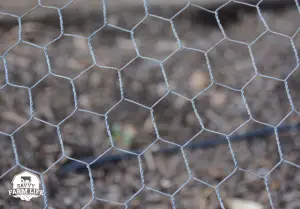Best Types Of Duck Fencing
Ducks are friendly, affectionate birds with big personalities. They can make excellent backyard pets for people wanting an animal that’s less traditional than a dog or a cat. Ducks, unlike cats and dogs, need to be housed outside in order to guarantee their contentedness. Along with their outdoor housing requirements comes the added responsibility of protecting them from predators. One of the best ways to do this is by using fencing. So, what are the best types of duck fencing?
The best types of duck fencing to use are welded wire, chicken wire, chainlink, and electric fences. Unlike other animal fencing, the goal of surrounding your ducks is not to keep them from escaping, but, instead, to keep predators out.
In this article, I’ll be exploring the best types of fencing for housing your ducks, as well as what predators you may have to protect them against. Depending on the area that you reside, your budget, and the size of your duck flock, your fencing needs may be different from other duck owners. The goal is to provide you with enough information on each kind of fence so that you can make an informed decision about which variety of fencing will best fit your needs. Let’s get into it!
Duck Fencing Options
Chicken Wire Duck Fencing 
Chicken wire is not sufficient to protect against predators by itself. This thin, wire is easy to find, cheap and can be molded for a stress-free installation. Chicken wire is so thin that it’s actually only good at fencing in your flock; it does virtually nothing to protect them from other animals.
Because it is easy to find and usually cheaper than other kinds of fencing, chicken wire can be very good “reinforcement” fencing. By this, I mean you can use it to enclose the top of your fenced-in area or to reinforce spots where you may want two layers of protection. Chicken wire usually sells for about $40 per 50 feet of wire.
You can also use chicken wire to separate certain parts of your flock within the enclosure. For example, broody ducks and their babies may need to be kept away from the rest of the flock. Or, if you don’t want your flock breeding with each other, you can use chicken wire to separate the males and the females.
All in all, chicken wire is always good to keep on hand, but it will not adequately protect your flock from predators on its own.
Welded Wire Duck Fencing
Welded wire is a kind of fencing that’s very popular amongst farm owners. It can be used to house or contain a multitude of animals, including poultry, sheep, and goats. Welded wire fencing features the intersection of two wires to form a pattern of “squares” in the fencing.
The connection points between these two wires are then welded together to melt them into a secure intersection. This type of fencing has a little bit of give to it, meaning it is slightly flexible and will bend under the weight of a heavy animal. If you’re using welded wire to enclose ducks, however, it should be plenty durable to protect against foxes and raccoons.
Due to its durability, welded wire is typically more expensive than chicken wire. I found it online for about $90 per 100 feet of wire. Keep in mind that it’s also less readily available than chicken wire, which I was able to find at Home Depot. When looking for welded wire, I had to find a specialty online retailer, but you may be able to find some at your local feed shop.
Electric Duck Fencing
Electric fencing really only needs to be employed when you’re trying to protect your flock from larger animals, such as bears or mountain lions. It can, however, be a useful tool for warding off pesky smaller predators too.
While a whole fence that is electrified is most likely unnecessary, small electric wires can help discourage raccoons and foxes from getting close to your enclosure. My advice would be to build a fence with welded wire, then run a string of electrified along the top and bottom of the fence. You would, obviously, run the wire on the outside of the fence to ward off predators and avoid accidentally harming your ducks.
One downside of electric fencing is that it is much more expensive than the other options on this list. For example, I found an electric fence energizer and aluminum wire combo set on Amazon for only $50. This doesn’t sound like too much of a commitment until you realize that similarly to the chicken wire, you still need to purchase fencing to attach the wire to.
So, electric fencing should really be viewed as more of an add-on to any existing fencing that you have for your ducks, rather than a whole option in and of itself.
All in all, the best option for protecting your flock from predators is a combination of these different fence varieties. You can find welded wire in different sizes and prices, which you can then use to initially enclose your flock. After, if you still wanted additional protection, you could add electric fencing or chicken wire to further ensure the safety of your ducks.
Tips for Building Your Duck Enclosure With Fencing 
It’s important to note that ducks have no natural defenses against predators, except for flying away. Most domesticated ducks, like the Pekin, are naturally flightless, so providing them with proper shelter and fencing is integral for their safety in a farm or backyard setting.
The first tip that I have is to be aware of your enclosure and how predators think. For example, a raccoon or fox may be able to dig underneath the fencing in an effort to snack on one of your birds. In order to combat this, you’ll need to root your fence about 18” deep into the ground.
You should also make sure that there are no structures or objects close to your fence that potential predators could use to climb on top of. Even if your fence is 6’ high, hungry animals will find a way to get over or around it. Always do a safety check during which you allow three to four nights as a dry run to see if any animals can break into the enclosure before placing your precious ducks in there.
Even in best-case scenarios, predators can be sneaky and sly; you may just have to learn the hard way which fencing options work and which do not.
Raccoon and foxes’ ability to scale tall fences also necessitates a barrier between the top of your enclosure and the sky, especially at nighttime. It’s never a bad idea to give your flock an extra layer of protection in the face of the enemy.
Using Fencing To Keep Predators Away From Ducks
I want to go over some common duck predators that may threaten your flock so that you’ll have a better understanding of how to keep them safe. The threat of each individual predator depends entirely on what animals are native to your area, so it’s a good idea to specify your research further to your locality.
Protecting Ducks From Foxes
Foxes are one of the most common predators of ducks. These conniving little thieves can jump up to three feet in the air, and they can climb even higher (up to six feet). They are difficult to escape because they often sneak up on their prey silently and quickly.
In addition to their natural adeptness for hunting, they are also intelligent creatures who will mercilessly stalk and kill their prey. Due to their slyness, they have no problem attacking a flock of ducks during the day, even though they are semi-nocturnal. Wherever the ducks are, the foxes will come.
Protecting Ducks From Hawks
Hawks are difficult to protect against simply due to their avian-hunter status. They can quickly swoop in and pick up any duck they would like in the blink of an eye. This is why it is very important to protect the top of your enclosure with chicken wire or other fencing; you’re really just protecting your ducks against predatory birds like these.
Hawks tend to grab their prey with their sharp talons and fly them to a secondary location, while they’re still alive, to finish the job. These birds are born-killers and very hard to stop once they set their stomachs on something tasty. However, hawks are not as big as some of the other predators on this list, like foxes, therefore they may have a harder time capturing larger breeds of duck.
Protecting Ducks From Raccoons
Unbeknownst to most, raccoons are actually meat-eating predators. While we think of them as cute, little “trash pandas”, they hunt everything from chickens to ducks. It’s important to protect your flock against these unassuming killers if you do choose to build an outdoor enclosure for them.
Raccoons are nocturnal, meaning they do most of their hunting at night. This means you have to have a sturdy enclosure that can withstand the digging, climbing, and scurrying efforts of these predators.
As I mentioned previously, it’s important to do your own research on local predators in your area before deciding on a fencing option for your ducks.

